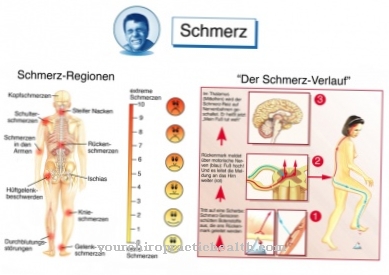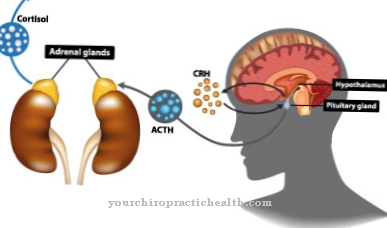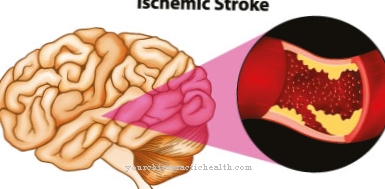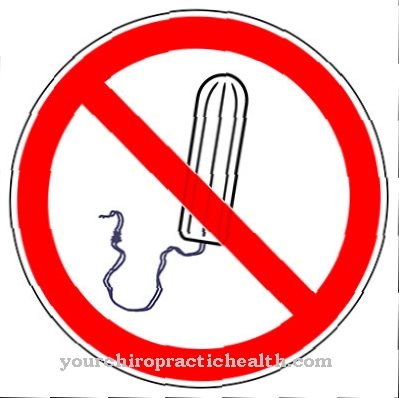As Testicular cancer is the name of a malignant tumor or cancer that can develop in a man's testicle from the germ cells. Definite causes that lead to testicular cancer have not yet been scientifically proven. Testicular cancer can usually be treated very well these days.
What is testicular cancer?

Under Testicular cancer is a malignant tumor that affects the male testicles. This develops from the same germ cells of the testicle from which the sperm arise. About 95 percent of these tumors are malignant, but testicular cancer is a very rare form of cancer in men. Only about two percent of cancers in men involve testicular cancer.
This disease occurs most frequently between the ages of 20 and 40, with European men being affected much more frequently than men from Africa, for example. Why this is so, however, has not yet been clearly clarified. A hard swelling of the testicles is typical of testicular cancer, but it is usually painless. You can feel it yourself. Usually this also increases; however, the process takes a long time. At this first, but clear, sign, a doctor should be consulted in order to rule out the disease.
Other symptoms can also occur in testicular cancer, for example decreased sexual desire, an enlarged male breast or the accumulation of watery fluid around the testicles. If the disease is more advanced, problems such as back pain or shortness of breath can arise.
causes
The causes for Testicular cancer are still largely unexplained scientifically. Although testicular cancer is not hereditary, it can still be assumed that it is genetically predisposed. Testicular cancer is also more common in people who suffer from undescended testicles.
Normally, the testicle migrates from the abdominal cavity into the scrotum in the embryonic age. However, this can be disturbed by certain factors and the testicles remain in the abdomen or the groin - this condition is also called undescended testicles and should be treated in an operation. Although this disease is curable, affected men have a significantly increased risk of developing testicular cancer.
Testicular cancer usually only affects one testicle. Men who have had testicular cancer on one side are of course at risk of developing it on the other side of the testicle.
Symptoms, ailments & signs
There are a number of signs and symptoms of testicular cancer that are important to understand. The most common symptom is a lump-like swelling or hardening of the testicle, which can be felt from the outside and usually does not cause pain. In most cases this symptom only appears on one side and not on both testicles at the same time.
In addition, there may be other symptoms associated with testicular cancer. Many patients experience an indefinite feeling of heaviness in the testicles. In the further course of the disease, pain can also occur, which is perceived as pulling on one side and often radiating to the groin area. Furthermore, fluid can accumulate on the testicles.
Because testicular cancer affects the production of the sex hormone testosterone, hormonal symptoms such as infertility or a decrease in libido, or sexual desire, can also be signs. Unilateral or bilateral breast enlargements and pain in the mammary glands are also among these signs.
In the advanced stages of testicular cancer disease, metastases can cause further non-specific symptoms such as shortness of breath or back pain, depending on the affected body regions.
Course of disease
Will the Testicular cancer Recognized in good time, the course of the cancer is usually favorable, as an operation or therapy almost always leads to a cure. However, if the disease is recognized late and metastases have already formed, the chance of a cure is considerably reduced. Nevertheless, the chance of survival due to chemotherapy and radiation therapy is quite high.
Testicular cancer usually develops on one side. Both halves of the testicle are rarely affected. Only when both testicles are involved and have to be removed with an operation is the patient no longer able to procreate. If only one testicle is affected, nothing stands in the way of the affected person's desire to have children.
Complications
With early detection and appropriate treatment, the chances of recovery are very high. If testicular cancer remains untreated, however, it leads to death. The disease can lead to complications, especially at an advanced stage. The symptoms worsen and the pain gets worse. In addition, the therapy can cause side effects.
As with any tumor, metastases can develop, daughter tumors that spread to adjacent organs. These are usually associated with back pain and swelling of the lymph nodes in the adjacent body region. Further complications arise depending on the type of treatment. If, for example, both testicles have to be removed, the male sex hormone must be supplied artificially by means of medication.
This is not the case with one-sided removal, as it is still sufficiently produced. In addition, chemotherapy can have an adverse effect on the entire body. In addition to hair loss, possible side effects include an increased susceptibility to infections and sensory disorders.
Furthermore impotence can occur if the sperm production is impaired by the chemotherapy. In many cases fertility is only reduced for a certain period of time, but under certain circumstances it can remain. Before the treatment, the doctor will advise on any risks that may arise and how to prevent them.
When should you go to the doctor?
A doctor's visit is recommended if there is pain or swelling in the testicles. If the testicle enlarges for no apparent reason, there is cause for concern. Before taking pain medication, a doctor should be consulted. In the event of sexual dysfunction, abnormalities when touching or generally an uncomfortable feeling in the scrotum, a control visit to a doctor should be made.
If the skin becomes discolored or if there are other changes to the skin in the genital area, it is advisable to consult a doctor. If the person concerned has behavior problems, a feeling of illness, fear or panic attacks, a visit to the doctor is necessary. If existing complaints spread or if they increase in intensity, a medical examination must be initiated as soon as possible.
Pulling pain in the abdomen, back pain or shortness of breath are warning signs that the disease is progressing. As there is a risk of the patient's premature death without medical treatment, a doctor should be consulted immediately. If there are unusual sensations in the genital area while moving or if the person concerned suffers from a feeling of tightness, a doctor is required to clarify the perceptions. If you experience feelings of shame or disgust or if you experience sudden conflicts between partners, you should see a doctor.
Doctors & therapists in your area
Treatment & Therapy
To treat Testicular cancer different therapy options are available. Surgery as well as radiation or chemotherapy are possible. The choice of the appropriate treatment depends on the type of cancer or the stage in which the disease is.
In most cases, the affected testicle is removed in an operation. This removal of the testicle, including the epididymis and spermatic cord, does not affect fertility or sexuality. Once this operation has been carried out, the so-called surveillance strategy is applied and it is awaited whether the cancer could be defeated. If this is not the case, radiation or chemotherapy may follow.
Outlook & forecast
The prospect and prognosis of existing testicular cancer depends very much on the time of diagnosis. The earlier testicular cancer is detected, the better the chances of a complete cure. Those who decide on appropriate treatment at an early stage significantly increase their chances of recovery. In most cases, however, chemotherapy is essential.
Overall, testicular cancer can be cured and treated very well. The survival rate is 96%, whereby medical treatment should definitely be carried out. Otherwise, the chances of a full cure drop dramatically. In the worst case, even death threatens if the person concerned completely forego medical treatment. If left untreated, the metastases multiply within a very short time, so that subsequent therapy is almost ineffective. In the further course severe pain occurs, which can only be alleviated with appropriate medication.
In general, if you have testicular cancer, medical and drug treatment is mandatory. Without such treatment, testicular cancer cannot be cured.
prevention
Preventive measures against Testicular cancer are not known to date. It is only important to see a doctor at the first signs, because the earlier testicular cancer is detected, the better the chances of a cure. In the early stages, the chance of recovery is almost 100 percent.
But even if the cancer is more advanced, the chances of a cure in this type of cancer are usually quite good. As the only preventive measure, men should regularly scan their testicles for any changes. This is especially true for men between the ages of 15 and 40, because this is the age at which testicular cancer occurs most frequently.
Prevention through frequent sexual intercourse or masturbation has not been scientifically proven.
Aftercare
Close follow-up care for testicular cancer is indispensable after therapy. The attending physician will determine an individually coordinated procedure for this. As a rule, the follow-up examinations take place in a specified cycle. In the first two years after the end of therapy, the examinations are carried out every three months.
In the following year the cycle is extended to four months, in the fourth and fifth years to six months. Close controls are particularly important in the so-called “wait-to-see” therapy in the early tumor stage. Regular checks ensure that any new tumor formations can be detected early and other secondary diseases can be excluded. Five years after the end of therapy, follow-up examinations at longer intervals are sufficient.
Here, too, the attending physician decides on an individual basis. The individual situation and the course of the disease are decisive here. It should also not be neglected at what stage the tumor was at the time of diagnosis. The most important examinations after the end of therapy include general, comprehensive physical examinations.
The tumor marker in the blood is also regularly determined. Ultrasound examinations of the scrotum and X-rays of the lungs are standard in order to be able to recognize possible new growths early. Computed tomography or magnetic resonance imaging of the abdomen is also recommended. With regular palpation, the patient himself can also help identify possible complications in advance.
You can do that yourself
Testicular cancer always requires medical treatment. The chances of recovery are very good here, but these can also be improved with the help of the affected patients.
Men should feel their testicles regularly for changes. This improves the chances of diagnosing testicular cancer early with the high chance of keeping the testicles fully functional even after therapy. Since the risk of testicular cancer is highest in early childhood undescended testicles or a family history, a self-examination should take place especially in these cases. The testicles are scanned for lumps and swellings while showering or bathing. If there is also a feeling of heaviness or pulling as well as painful mammary glands, a doctor should be consulted urgently.
With early treatment, the cancer can be cured up to 95 percent completely. However, if the doctor is consulted too late, it is possible that one or both testicles will have to be removed. If family planning has not yet been completed, the semen can be frozen in a sperm bank prior to chemotherapy and radiation, in consultation with the doctor, so that it can be used again later for artificial insemination. Furthermore, condoms should be avoided during sexual intercourse during radiation therapy and chemotherapy in order to prevent the chemotherapy drugs from entering the partner's cervix.

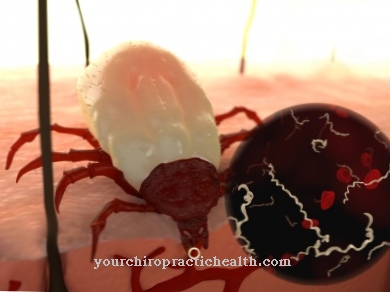
.jpg)
